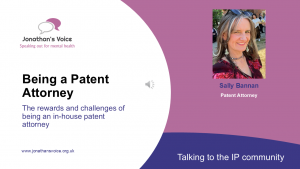Emily is a UK and European patent attorney. She is currently VP of San Francisco Liaison Office, Kilburn&Strode LLP. Emily wrote the article below for IP Inclusive (www.ipinclusive.org.uk) to mark Time to Talk Day – February 4th 2021. Thank you Emily for allowing us to share this powerful article on our website.
Time to Talk is a day for spreading awareness and breaking down stigma surrounding mental health issues in the UK. After this most difficult of years, the conversation on mental health on this Time to Talk day is more essential than ever. I enjoy to, and feel compelled to, write about my experiences with mental health to further the conversation, and in the hope that reading about my experiences might help others. It is a relief to feel as though there is something I can do, when so many aspects of mental health problems are clouded in a fog of helplessness. For this reason, I set my mind to writing an article on mental health.
It took me a while to start. I wanted to find a hook, something interesting or insightful to say about mental health in the workplace. The problem is, I’m not qualified to provide any great insights, suggestions or guidance. I have realised that Time to Talk day does what it says on the tin. It’s not ‘time to provide a fix for the stigma around mental health’ day or ‘time to write something ground-breaking about a complex field for an online IP publication’ day. It’s time to talk day. It’s time to use the simple tool of sharing our experiences to dismantle the taboo around mental health and fill the deafening silence in which many conscientious, talented people are drowning. Talking may be a simple tool, but it can work.
Here’s how opening up a conversation can help:
1. Poor mental health can be improved by seeking treatment

2. If you don’t receive help or treatment, your mental health is less likely to improve and might get worse

3. Stigma and taboo are two things which might prevent you from seeking treatment
4. Silence around the subject of mental health provides an echo chamber in which, in the absence of discussion to the contrary, we all believe others will judge us for poor mental health.

So, we can see that simply talking about mental health might help someone else receive treatment. Hence the beauty behind ‘time to talk’ day.
[side note: I sometimes worry that the way time to talk day is promoted puts an onus on those suffering with mental ill health to talk about their experience, as it is assumed to either be beneficial to them or their duty to help others. I disagree on both counts. Many people dealing with mental ill health spend every hour of the day talking about, and thinking about, their mental health with little escape. The last thing these people need is a media-enforced discussion about it. Similarly, it is never the duty or responsibility of an individual to disclose their own experiences for fear of not helping another. You should never feel obliged to discuss your mental health. It is entirely your business.]
Below I share experiences which I am sure a large percentage of people working in IP, law or in professional services as a whole have experienced, and yet which aren’t discussed in the profession. I think these things are normal, and that talking about these things is not shameful. I also note that I have experienced these things and they have zero impact on how good a patent attorney I am.
You are not alone if you feel the pressure is overwhelming
Sometimes I can’t face the idea of putting myself through another week of having to be all of the things I tell myself I must be. Cheerful and efficient and kind and faultless and not too assertive, nor too submissive (these last two things might have something to do with being a woman in an overwhelmingly male profession). I need to be easy to get on with, to care about my colleagues, to meet my hours targets, to avoid typos, to have a few innovative ideas for improving processes and a killer plan for developing business. I feel I need to do all of these things without failure or else that’s exactly what I will be, a failure.
Of course, I’ve learnt that this is not a healthy way to think, or to live, and if you feel similar things I encourage you to talk to someone or get help.
You are not alone if you feel worried all-the-bloody-time
This can be a very stressful job. There are deadlines and clients and hard legal questions and office politics and targets and budgets. It’s worrying, and so perhaps not surprising that it is sometimes difficult to sleep. But it’s interesting that the things which I feel pressure from, the things which leave my lying awake, by and large are not real-life events or demands. Missing hours targets can be disappointing, but my assumption that missing a target means I have zero worth is far more worrisome. The strict demands placed on me aren’t from the words in my contract of employment, they are in the impossibly high standards I set for myself. Overachieving is exhausting; a horrible feedback loop in which succeeding one day means the stakes for tomorrow are even higher, and there’s even more to be lost.
The drive to do a good job is no bad thing. I enjoy being a patent attorney, and I’m very fortunate to have a job which I find both challenging and engaging. However, the internal narratives many of us create around success and self-worth are problematic. They can result in careers in which, instead of feeling fulfilled by hard-work and our genuine successes, we are slaves to our need to achieve, impress and not let others down. It is possible to have a successful career without relying on that success to validate your worth as a person.
You are not alone if you’ve lost sight of the things which once brought you joy.
Depression is an illness which can take the wind from your sails. All the joie de vivre, the drive and energy you once had is replaced by an absence of…anything, really. It may be an underlying and inescapable sadness, a self-loathing or a deeply held belief that in fact the situation is irreparably wrong. Sometimes not even sadness. Just a hopelessness, or helplessness in which even the smallest tasks seem insurmountably difficult and indescribably pointless. Complete emotional inertia. It can be lonely, terrifying, and incredibly tedious all at once.
Many people in our profession go through similar experiences to this, and many people get through the other side to a better place. If you feel this way, there are lots of ways you can get help. I want to share this experience because I know I am not the only one to have felt this way.
You are not alone if you have a coping mechanism.
There is a multitude of behavioural patterns and coping mechanisms common in professional services, and each is a uniquely complex form of suffering. Drugs, alcohol and gambling, to name but a few. I am not sure of the prevalence of eating disorders in this profession, but I know that eating disorders are more prevalent in high-achievers, are linked to anxiety and control. I know that eating disorders have very little to do with logic, and nothing to do with the knowledge that a behaviour is damaging. When things seem stressful, you feel as though you have to meet impossible standards to keep your place at the table, and you feel your every move is being judged, control is everything. Many people before you have, and after you will, find themselves caught in a pattern of behaviour.
If you rely on unhealthy coping mechanisms, I encourage you to seek help. You are not alone in suffering, and there are many in the profession who have successfully sought help. A disappointing consequence of our reluctance to share our experiences of mental health problems is that we are also denied the stories of those who have been in a similar position and recovered. Not only are we denied a feeling of human connection to a shared experience, we are denied the beacon of hope that things can improve.
There are many more…
- You’re not alone if you feel you’re not good enough.
- You’re not alone if you’re scared to ask for help.
- You’re not alone if you have a diagnosis you are furiously trying to hide.
- You’re not alone if you get therapy.
- You’re not alone if you take medication. Or if you don’t take medication.
- You’re not alone if you’ve never experienced anything like this.
- You’re not alone if you’re worried for a colleague, or a friend, or a family member, and feel at a loss of how to help.
Generally, the rule of thumb is: whatever you’re feeling or experiencing, you’re not alone. It can seem as though you are, because silence around an issue can be misinterpreted as an absence of shared experience of that issue. Trust me, that is not the case. There are whole networks where you can find that you’re not alone. IP Inclusive has a great collection of resources https://ipinclusive.org.uk/mental-health-and-wellbeing/ , Jonathan’s Voice has great resources including a guide to protecting your mental health and wellbeing for patent and trade mark professionals and a newly published guide for senior leaders about creating a mentally healthy workplace. https://jonathansvoice.org.uk/resources
A further consequence of the silence around mental health, beyond leading many to believe they are suffering alone, is a misconception that seeking help for mental health problems might have a negative impact on one’s carer. For many this unspoken concern is a huge deterrent to seeking help. I believe that majority of employers encourage and support employees seeking help for mental health problems (I am lucky enough to be employed by one). However, I also think that the silence around mental health is prominent within most organisations, and in the absence of explicit and positive confirmation from the organisation’s leadership, the lingering myth will remain. I implore organisations and those in leadership to let your employees know that seeking help for mental health problems is encouraged, and will not negatively impact their standing in the company. The experiences I’ve shared above are not uncommon. This doesn’t mean that by normalising the conversation we should accept that these experiences are inevitable and part-and-parcel of working in our profession. It is possible to have a profession which prioritises the wellbeing of those working in it without compromising productivity or the quality of work produced. We can strive for a profession in which we foster supportive environments so that, if any of our colleagues visits one of the places described above, their visit is fleeting. A first step can be a simple conversation acknowledging the experiences shared by so many. Together we can begin to remove the blockades in the road between illness and treatment.








